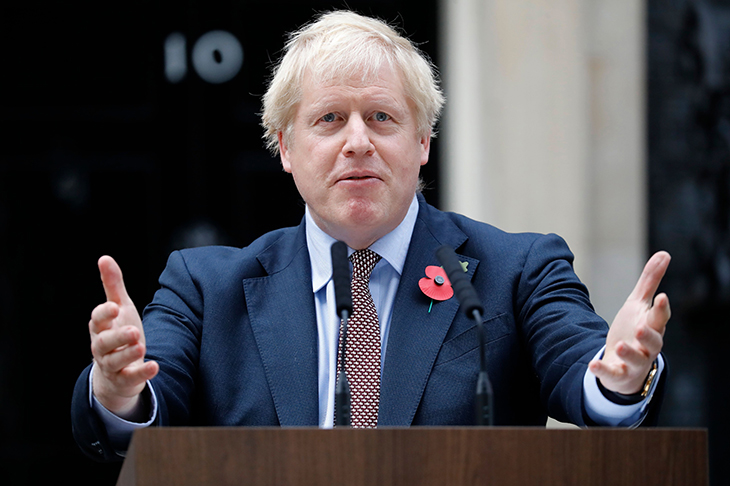The Tories’ great fear in this campaign is that they can get their vote out, squeeze the Brexit party right down and still lose. Why? Because their strategy relies on the Liberal Democrats taking a chunk out of Labour’s Remain vote. If Labour manages to rally the Remain vote in the way that it did in 2017, then we are heading into hung parliament territory and a situation where the Tories cannot govern because they have no potential partners.
The complication for the Tories is that they also need to win back a chunk of their Remain voters who have gone over to the Liberal Democrats and hold off a challenge from Jo Swinson’s party in a host of constituencies. There are 20-odd seats that the Tories hold which the Liberal Democrats would take with a swing of 15 percent or less.
Some Tories think that Swinson should take part in the big TV debate with Boris Johnson and Jeremy Corbyn because it would aid her effort to peel off Labour Remainers. But one influential figure on the Tory campaign dismisses that idea as ‘too clever by half’, pointing out that if Swinson repeated Nick Clegg’s 2010 debate victory, then dozens of Tory seats would become vulnerable to the Liberal Democrats. The Tories can’t simply talk up the Liberal Democrats in an attempt to help them take a chunk out of Labour’s Remain vote.
In their own seats, the Tories intend to squeeze the Liberal Democrats in two ways. First, they’ll emphasize that a vote for the Liberal Democrats risks making Corbyn prime minister. The Tories want to argue that this election is about whether you want Johnson or Corbyn as prime minister, which explains why they are so keen for the two to go head-to-head on TV.
There are some signs that this message is already working. A Tory MP with a slim majority over the Liberal Democrats says that ‘the Corbyn squeeze message is the most potent. The Lib Dem vulnerability is that they can’t explain how they get the second referendum without Labour and my constituents really don’t want Corbyn as PM’.
The Tories also hope that they can undermine the Liberal Democrats further with their message of ‘let’s get Brexit done’ so the country can move on. When Johnson was suggesting going through with Brexit even without a deal, this message was not going to work with Lib Dem/Tory waverers. But his deal has changed the dynamic. As one No. 10 aide admits: ‘If you had gone on no deal, it would have been bloody hard to sell in those constituencies.’
Polling shown to political cabinet on Tuesday found that the ‘Leave with this deal’ message is attractive to 2017 Tory voters who have gone over to both the Liberal Democrats and the Brexit party. ‘The deal is the thing that unlocks everything,’ argues one Tory involved in drawing up the party’s electoral strategy. ‘You can say to Brexiteers “We’re the only ones who can deliver it”, and to the soft Tories and soft Lib Dems “Don’t worry, there won’t be no deal”.’
Tories are becoming more optimistic that their losses to the Liberal Democrats will be less than people expected even a few weeks ago. However, the other part of the equation — how much the Liberal Democrats take from Labour — is out of their hands yet vital to their prospects.
YouGov polling in London shows that if the Liberal Democrats turn in a strong performance, the Tories could make gains from Labour even if their own vote has gone down because support for Labour has fallen by more. But if Remain voters start voting tactically for whoever is most likely to defeat the Tory candidate then Johnson won’t be spending Christmas at Chequers. As one Tory cabinet minister puts it, the question is whether this election is like 1983 — when the center-left vote split, letting the Tories win more seats on a reduced share of the vote — or like 1997, when tactical voting exacerbated Tory loses.
Tory ministers have been watching the polls nervously for any sign of a sustained Labour uptick, because they fear the Remain vote coalescing around Labour. Since parliament voted for the election, Labour has succeeded in squeezing the Liberal Democrats a bit. The Liberal Democrat vote is soft too. Right now, only 39 percent of those saying they support the party are certain to vote for it.
One encouraging sign for the Tories is Corbyn’s determination to maintain Labour’s Brexit ambiguity. In an interview with the Guardian this week, he was clear that he won’t shift from his position of saying that Labour will negotiate a new deal with the EU before holding a second referendum and only decide what to campaign for once the new deal has been agreed. This policy risks alienating Leavers and Remainers alike. Leavers suspect that you would only have a second referendum because you didn’t like the result of the first one; Remainers are irritated by Corbyn’s refusal to commit to staying in. Meanwhile, those who are just thoroughly sick of the issue won’t welcome the prospect of next year being even more dominated by Brexit than this year has been.
CCHQ’s hope is that Labour will find conversations about Brexit tricky. Voters who want to Leave will turn to the Tories, and those who want to Remain will go to the Liberal Democrats. CCHQ strategists think that Labour’s decision to start saying they will ‘get Brexit sorted’ is proof that the Tory line that they will ‘get Brexit done’ is working. They think that Labour’s commitment to another negotiation and another referendum means that the public won’t find the idea of Corbyn sorting Brexit credible. Indeed, both the Tories and the Liberal Democrats benefit from keeping this election focused on Brexit.
An election is always a risk for any prime minister. But one of the things that makes this election so precarious for Boris Johnson is that he is not fully in control of his own destiny. His fate depends, to an uncomfortably large extent, on how the Labour-Liberal Democrat battle plays out.
This article was originally published in The Spectator’s UK magazine. Subscribe to the US edition here.


























